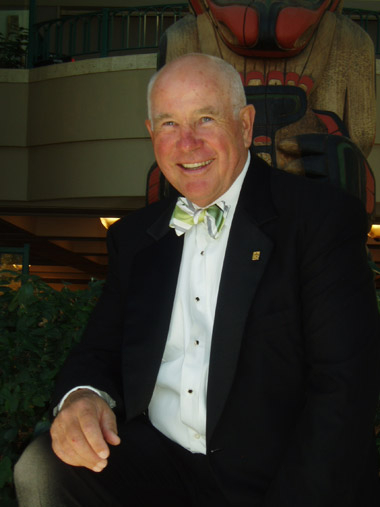David E. Ritchie
Class of 2006
- Chairman of the Board Ritchie Bros. Auctioneers

The most important thing is to never give up. You will learn that the more you try, the easier it gets.
David Ritchie is the youngest of six children. By the time he was born in 1936 in Kelowna, British Columbia, his father had lost all he owned. A practicing attorney, Ritchie's father had lost a legal battle against agricultural co-ops. As a result, was disbarred and forced to give up his ownership of several orchards. Penniless, the Ritchie family moved into a rented home on a tobacco farm, and Ritchie's father eventually found work as a fruit inspector.
"My family was going through a very rough time when I was young," says Ritchie. "We often ate nothing but porridge two or three times a day. We all tried to help as much as we could. I remember as a little wee boy joining my brothers and sisters to pick potatoes. We earned six cents for one sack of potatoes."
In 1939, Ritchie's father enlisted in the Canadian Army when Canada entered World War II. Because he was a World War I veteran, he was not sent overseas, although he was away from the family for a number of years. Ritchie's older brother was later killed in the invasion of Normandy on D-Day. "That was a very sad time for my family," says Ritchie. "He was the oldest son and my father was bitter over his death."
When Ritchie was six, his family bought a modest home in Kelowna that had a monthly mortgage payment of $25. "Kelowna was a great place to grow up," he says. "Even though we were poor, we were a happy family. My mother had a beautiful singing voice and she played the piano and sang to us. My father was a little more serious, especially after my brother's death. He made us listen to the news every morning and evening on the radio. He mounted a large map on the wall in our kitchen and when something happened in the world, he would take us to the map and show us where it was. I got a great command of world geography. We may have had nothing, but I never felt poor. I had a positive outlook and a deep appreciation for all I did had."
When he was 12, Ritchie worked on a farm that was three miles away from his home. He made $2 a day herding cattle, milking cows, and weeding corn. To get to work, his father bought him his first bicycle for $8. "It wasn't much of a bike," says Ritchie. "I went to the bicycle store and was able to talk my way into trading my bike plus eight $5 payments for a Hummer from England. I made the payments faithfully and owned it by the end of that summer. That made me the proudest kid in Canada. From then on, I always had cash in my pocket. I'd get up early on Sunday morning and go to the park to collect beer bottles, which I traded in on Monday after school. I loved to sell things and did a lot of door-to-door sales in Christmas trees and greeting cards. I was happy to have these jobs. They taught me the importance of self-reliance and the value of hard work. When you live with poverty, everything you get looks better and tastes better and you deeply appreciate every little thing that comes your way."
After the war ended, Ritchie's father bought a second-hand furniture store, the OK Used Furniture Store, which fascinated Ritchie. After school, Ritchie maintained the store's potbellied stove and swept the floors. In 1955, Ritchie and his two brothers took over the business, which they later renamed Ritchie Bros. Auctioneers.
In 1958, the brothers held an auction in an effort to raise $2,000 for a loan payment. By the end of the day, they had not only made enough to make the payment, but they had also discovered a new approach to their business.
Ritchie Bros. Auctioneers soon became the largest industrial auction company in the world. Ritchie served as CEO until 2004, and as chairman of the board until 2006. In 2005, he received the University of Victoria, Peter B. Gustavson School of Business' Distinguished Entrepreneur of the Year Award.
Ritchie hopes that young people will develop confidence in their ability to overcome their difficult start in life. "The most important thing is to never give up," he says. "You will learn that the more you try, the easier it gets. It's a simple philosophy. I believe that when you work hard, you pave the way for luck to find you."
